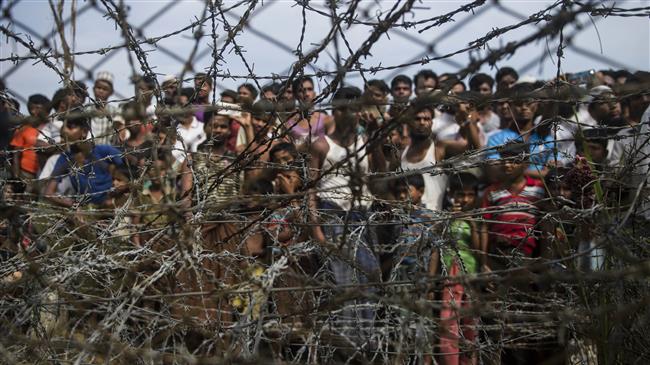
RNA - Following a closed-door meeting on Monday, the Council released a statement calling on the Myanmarese government to facilitate more social and economic development aid for the return of the Muslim refugees, Asia News reported.
The fifteen members of the Council “stressed the need to step up efforts, including through providing assistance to the social and economic development, in order to create conditions conducive to the safe, voluntary and dignified return of Rohingya refugees and internally displaced persons to their homes in [Myanmar’s] Rakhine state”.
Several members called for the body to impose sanctions on Myanmar’s government over the Rohingya crisis.
Myanmar launched a military offensive in August last year while the ensuing violent crackdown has forced nearly 700,000 Rohingya to flee Rakhine state for neighbouring Bangladesh.
Since August 2017, Myanmar's security forces committed nine distinct types of crimes against humanity, including murder, torture, deportation, rape, persecution, enforced disappearance and forced starvation, Amnesty's report said, as it put the responsibility on the army's top ranks.
The rights group announced that there was sufficient evidence to prompt an investigation into whether some or all military officials may have been "directly involved in planning, ordering or committing murder, rape, torture and the burning of villages".
Amnesty International has also accused and identified 13 senior Myanmar military officials for orchestrating crimes against humanity.
Many Rohingya Muslim refugees express fear of returning to their homeland, where they saw their relatives murdered by soldiers and Buddhist vigilantes.
The Rohingya have lived in Myanmar for generations but are denied citizenship and are branded illegal immigrants from Bangladesh, which likewise denies them citizenship.
The UN has already described the Rohingya as the most persecuted community in the world, calling the situation in Rakhine similar to “a textbook example of ethnic cleansing".
Bangladesh and Myanmar have also agreed in November last year to begin repatriating the Rohingya but the process has stalled, as the vast majority refuse to contemplate returning until their rights, citizenship and safety are assured.
But, the International Committee of the Red Cross (ICRC) stressed that it is not yet safe for thousands of Rohingya Muslims living in overcrowded refugee camps in Bangladesh to begin returning to their homeland of Rakhine state in Myanmar.
ICRC President Peter Maurer said on Sunday that a lot more was needed to improve the situation he witnessed in Rakhine during an official visit recently, World News reported.
"What I've seen in terms of destruction of villages, abandonment of situations, disruptions in markets, of livelihood, of communities, I don't think the present moment is an ideal condition to return," Maurer stated in Chakmakul camp for Rohingya refugees in Southeast Bangladesh.
"We need to prepare the ground for returns for those who wish to return," he added.
Aung San Suu Kyi, Myanmar's de factor leader who is also a Nobel Peace laureate, has come under intense criticism across the globe for having refused to hold the perpetrators to account.
The new UN special envoy for Myanmar, Christine Schraner Burgener, has said the Rohingya refugees “have to come back voluntarily, safe, in dignity, and in a sustainable manner”.
847/940